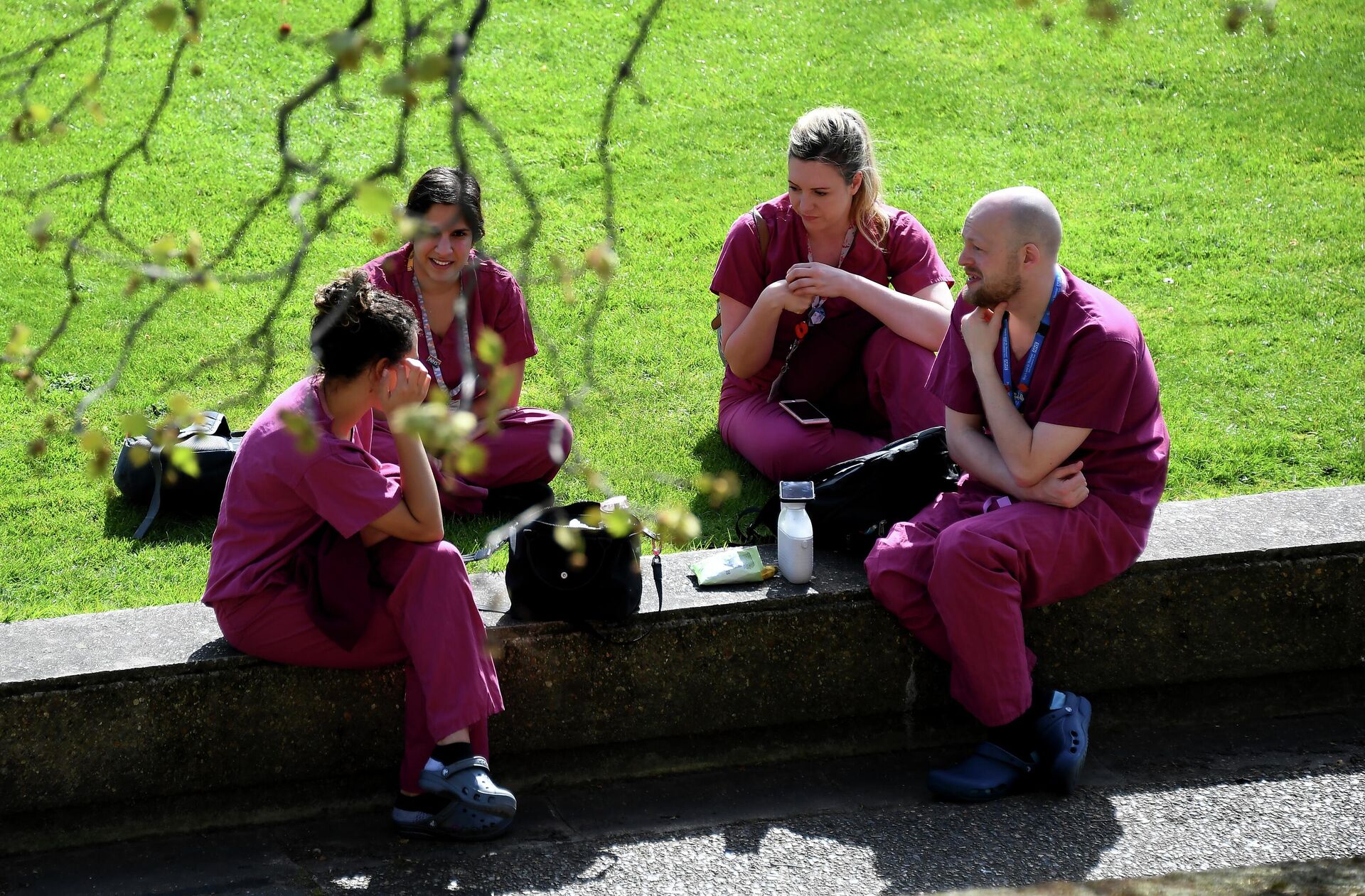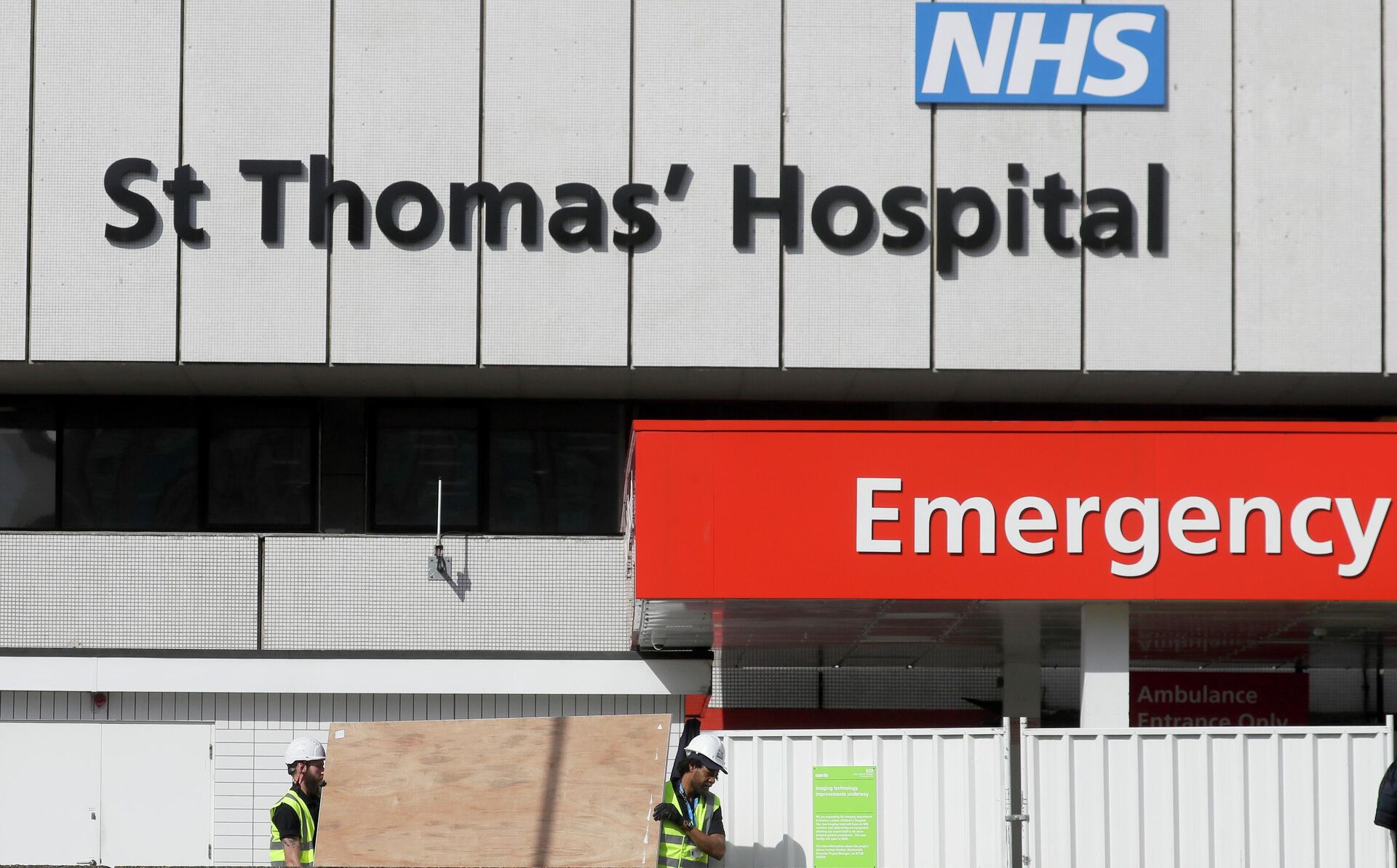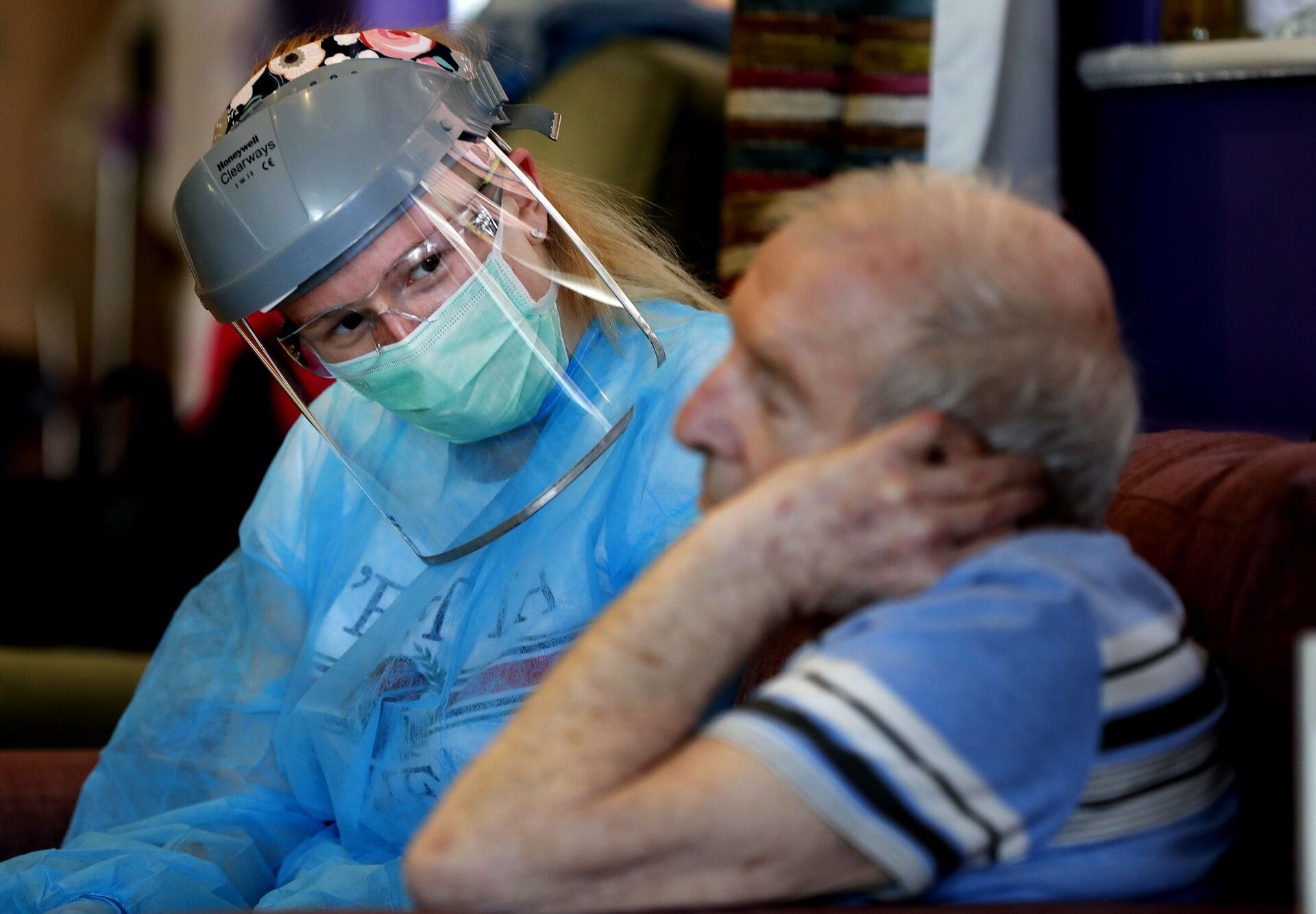https://sputnikglobe.com/20221104/understaffed--underfunded-how-gatekeepers-of-medicine-uk-gps-struggle-to-deliver-care--1103789464.html
Understaffed & Underfunded: How 'Gatekeepers' of Medicine, UK GPs, Struggle to Deliver Care
Understaffed & Underfunded: How 'Gatekeepers' of Medicine, UK GPs, Struggle to Deliver Care
Sputnik International
From funding to short-staffing and waiting list “backlogs” dating to the start of the COVID-19 pandemic, a plethora of challenges is facing the UK’s National... 04.11.2022, Sputnik International
2022-11-04T13:44+0000
2022-11-04T13:44+0000
2023-05-28T15:25+0000
national health service (nhs)
general practitioners
cost of living
understaffed
underfunding
inflation
united kingdom (uk)
https://cdn1.img.sputnikglobe.com/img/07e6/0b/05/1103806232_0:291:3123:2048_1920x0_80_0_0_ec03fdb4ccc702fd160715ae8675ef3e.jpg
No day is the same for a general practitioner (GP), but one thing you can be certain of is that it will be busy, intensive, and packed with unpredictabilities. This is the nature of the job that GPs, or family doctors as they are commonly referred to, carry out. They see patients of all ages and for nearly any issue, Dr. Bharat Pankhania, infectious disease specialist, told Sputnik.From routine duties, to emergencies, and sudden deterioration in a patient’s health, GPs are “what we call gatekeepers, they are doing more than just clinical medicine,” said the former trained general practitioner.A GP's day typically starts very early, with anything between 20 and 40 patients in morning surgery to see - mostly in person. There are also patients to telephone, analysis results to look at and act upon, prescriptions to be reviewed and given out. However, all this routine stuff can be upended if an emergency demands immediate attention.One also has to see to elderly people in nursing homes and care homes after their clinical surgery, followed up by a spate of home visits… And don’t forget the paperwork that also sucks up one’s time, Dr. Pankhania added. And if that sounds like a full day’s work load, there’s more: seeing another 20 to 40 patients in the evening.Of course, one of the reasons that UK GPs are currently so swamped is the post-COVID pandemic backlog.According to the former GP, a locum is never eager to do the organizing, the running of the practice, or the administrative stuff that makes the family practice run.“They just want to see their allocation of patients and be gone. So those are also issues with the way primary care at the moment is being delivered,” Dr. Pankhania explained.‘Understaffed & Underfunded’The pandemic, with its strict lockdowns and the work-from-home guidance brought with it a different pace, so to say. However, once the country began to emerge from that routine, things started to get extremely busy.On the one hand, patient expectations and Care Quality Commission expectations are high, but on the other hand, there is a huge burden of demand on GP practices, which lack doctors and assistants to meet these expectations. The result is a deplorable imbalance, according to the infectious disease specialist.There are other challenges that need to be dealt with, the expert added, singling out several issues. Firstly, there are regulatory "hoops" one needs to jump through if one wants to work as a GP. Then there are pension issues, making it difficult for potential general practitioners to return to work.He added that while the UK chancellor of the exchequer could easily address these with just one signature, so far this hasn’t happened. The infectious disease specialist said it was disheartening to see how the current taxation rules on pensions make it unprofitable to work as a GP, or as a clinician for that matter. Amid the difficulties the NHS is facing, such as tackling cost pressures driven by soaring inflation, long waiting lists for patients, and lack of staff, swamped general practitioners argue the need for more “family time.” GPs, whose core working hours are typically from 9am until 6:30pm, demand that two hours be scrapped, as their current work time indirectly “discriminates” against families. The sentiment that core hours are a “relic of the past" is particularly shared by female general practitioners, who are concerned that the “discrimination mostly affects female GPs.”Weighing in on this, Dr. Pankhania said the discrimination "is by design."A motion on ditching two-and-a-half hours, reportedly submitted to the Annual Conference of England LMC (local medical committees) representatives set for November 24, will be put to the vote by GPs. If it is passed, the innovations may find their way into the new GP contract in the UK, which comes into force in April 2024, as the British Medical Association (BMA) GP Committee would be mandated to argue for the reduction.However, this isn't a solution to the problem, the expert told Sputnik. The entire system is currently plagued by pressures, with doctors working well beyond the hours that they are paid for, he argued. Such a technical point as contracted hours won’t magically solve the problem of demand exceeding the supply of doctors.“The big elephant in the room is to address the shortage of health care specialists in primary care.”Furthermore, amid soaring two-digit inflation in the country outpacing people’s earnings, UK National Health Service (NHS) officials have been seeking more funding. According to NHS Chief Executive Amanda Pritchard, an estimated £7 billion in extra resources need to be allocated to keep up with inflation and tackle the waiting list “gridlock.”For the last 12 years, at least, there hasn't been a real-time rise in income for hospitals or GPs, Dr. Pankhania agreed. Now, amid rising inflation, it is a perfect storm, with clinicians, both hospital doctors and GPs, saying “this is not keeping pace with our expectations, we haven't had a pay rise for very long.” This is a long term problem finally coming home to roost, when people are saying “we have had enough,” Dr. Bharat Pankhania concluded.
https://sputnikglobe.com/20221017/wrongly-logged-stillbirths-indicate-deep-stress-in-nhs-system-academic-warns-1101966458.html
united kingdom (uk)
Sputnik International
feedback@sputniknews.com
+74956456601
MIA „Rosiya Segodnya“
2022
News
en_EN
Sputnik International
feedback@sputniknews.com
+74956456601
MIA „Rosiya Segodnya“
Sputnik International
feedback@sputniknews.com
+74956456601
MIA „Rosiya Segodnya“
no day is the same for a general practitioner, waiting lists’ gridlock, post-covid pandemic backlogs. soaring inflation, understaffed hospitals, a real-time rise in income for hospitals or gps, huge burden of demand upon gp practices, patient expectations and care quality commission expectations are high, increasing demand, but not an equal, proportionate increase in funding, taxation rules on pensions making it not profitable to work as a gp
no day is the same for a general practitioner, waiting lists’ gridlock, post-covid pandemic backlogs. soaring inflation, understaffed hospitals, a real-time rise in income for hospitals or gps, huge burden of demand upon gp practices, patient expectations and care quality commission expectations are high, increasing demand, but not an equal, proportionate increase in funding, taxation rules on pensions making it not profitable to work as a gp
Understaffed & Underfunded: How 'Gatekeepers' of Medicine, UK GPs, Struggle to Deliver Care
13:44 GMT 04.11.2022 (Updated: 15:25 GMT 28.05.2023) Longread
From funding to short-staffing and waiting list “backlogs” dating to the start of the COVID-19 pandemic, a plethora of challenges is facing the UK’s National Health Service (NHS). General practitioners in the UK are also seeking to have their core working hours slashed to allow for “more family time.”
No day is the same for
a general practitioner (GP), but one thing you can be certain of is that it will be busy, intensive, and packed with unpredictabilities. This is the nature of the job that GPs, or family doctors as they are commonly referred to, carry out. They see patients of all ages and for nearly any issue, Dr. Bharat Pankhania, infectious disease specialist, told Sputnik.
From routine duties, to emergencies, and sudden deterioration in a patient’s health, GPs are “what we call gatekeepers, they are doing more than just clinical medicine,” said the former trained general practitioner.
“They're trying to find beds for their patients that they want to admit to hospital. They're trying to get their patients referred to specialist services. They’re doing so many tasks that it often takes them away from clinical practice,” Dr. Pankhania, who is a senior clinical lecturer at the University of Exeter Medical School, explained.
A GP's day typically starts very early, with anything between 20 and 40 patients in morning surgery to see - mostly in person. There are also patients to telephone, analysis results to look at and act upon, prescriptions to be reviewed and given out. However, all this routine stuff can be upended if an emergency demands immediate attention.
One also has to see to elderly people in
nursing homes and care homes after their clinical surgery, followed up by a spate of home visits… And don’t forget the paperwork that also sucks up one’s time, Dr. Pankhania added. And if that sounds like a full day’s work load, there’s more: seeing another 20 to 40 patients in the evening.
Of course, one of the reasons that UK GPs are currently so swamped is the post-COVID
pandemic backlog.
“The situation is made worse, because of structural changes in the way people are working as GPs. Let me explain. For example, most people only want to be a locum GP. So what that means is they come in, they do their little slot of what they want to do, what they're contracted to do, and that's it. In other words, the way doctors are working in general practice these days doesn't really help family medicine as it used to do,” Dr. Bharat Pankhania clarified.
According to the former GP, a locum is never eager to do the organizing, the running of the practice, or the administrative stuff that makes the family practice run.
“They just want to see their allocation of patients and be gone. So those are also issues with the way primary care at the moment is being delivered,” Dr. Pankhania explained.
‘Understaffed & Underfunded’
The pandemic, with its strict lockdowns and the work-from-home guidance brought with it a different pace, so to say. However, once the country began to emerge from that routine, things started to get extremely busy.
On the one hand, patient expectations and Care Quality Commission expectations are high, but on the other hand, there is a huge burden of demand on GP practices, which lack doctors and assistants to meet these expectations. The result is a deplorable imbalance, according to the infectious disease specialist.
“We have underfunded our health care services. Simple as that. We have not addressed the issues. So, there has been an increasing demand, but not an equal, proportionate increase in funding. And the other tragedy is that because it has become a very demanding, high pressure, busy job, many GPs are choosing not to fully engage as family practitioners. They are working as what we would call locum GPs.”
There are other challenges that need to be dealt with, the expert added, singling out several issues. Firstly, there are regulatory "hoops" one needs to jump through if one wants to work as a GP. Then there are pension issues, making it difficult for potential general practitioners to return to work.
“If you have reached your maximum pension cap, then when you work, you earn money on which you pay a penalty, because you are contributing to a pension when you've already reached your limit. So you are facing a punitive tax,” said Dr. Pankhania.
He added that while the UK
chancellor of the exchequer could easily address these with just one signature, so far this hasn’t happened. The infectious disease specialist said it was disheartening to see how the current taxation rules on pensions make it unprofitable to work as a GP, or as a clinician for that matter.

17 October 2022, 18:45 GMT
Amid the difficulties
the NHS is facing, such as tackling cost pressures driven by soaring inflation, long waiting lists for patients, and lack of staff, swamped general practitioners argue the need for more “family time.” GPs, whose core working hours are typically from 9am until 6:30pm, demand that two hours be scrapped, as their current work time indirectly “discriminates” against families. The sentiment that core hours are a “relic of the past" is particularly shared by female general practitioners, who are concerned that the “discrimination mostly affects female GPs.”
Weighing in on this, Dr. Pankhania said the discrimination "is by design."
“What I mean by design is that usually, females have also got other responsibilities. Males have that same responsibility, but usually it is the mother who is also looking after the children and taking them to school and things. And then when you have got extra-long hours of working as a clinician, it is difficult to also operate as a mother. So it isn't discriminatory, like “we're going to be against women,” but the way the system is set up, it discriminates against that person who is providing care in the house, i.e. the mother.”
A motion on ditching two-and-a-half hours, reportedly submitted to the Annual Conference of England LMC (local medical committees) representatives set for November 24, will be put to the vote by GPs. If it is passed, the innovations may find their way into the new GP contract in the UK, which comes into force in April 2024, as the British Medical Association (BMA) GP Committee would be mandated to argue for the reduction.
However, this isn't a solution to the problem, the expert told Sputnik. The entire system is currently
plagued by pressures, with doctors working well beyond the hours that they are paid for, he argued. Such a technical point as contracted hours won’t magically solve the problem of demand exceeding the supply of doctors.
“The big elephant in the room is to address the shortage of health care specialists in primary care.”
Furthermore, amid soaring
two-digit inflation in the country outpacing people’s earnings, UK National Health Service (NHS) officials have been seeking more funding. According to NHS Chief Executive Amanda Pritchard, an estimated £7 billion in extra resources need to be allocated to keep up with inflation and tackle the waiting list “gridlock.”
For the last 12 years, at least, there hasn't been a real-time rise in income for hospitals or GPs, Dr. Pankhania agreed. Now, amid rising inflation, it is a perfect storm, with clinicians, both hospital doctors and GPs, saying “this is not keeping pace with our expectations, we haven't had a pay rise for very long.”
This is a long term problem finally coming home to roost, when people are saying “we have had enough,” Dr. Bharat Pankhania concluded.







